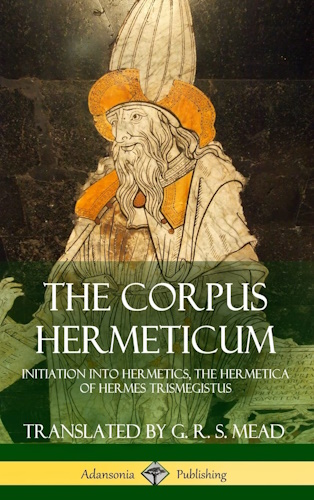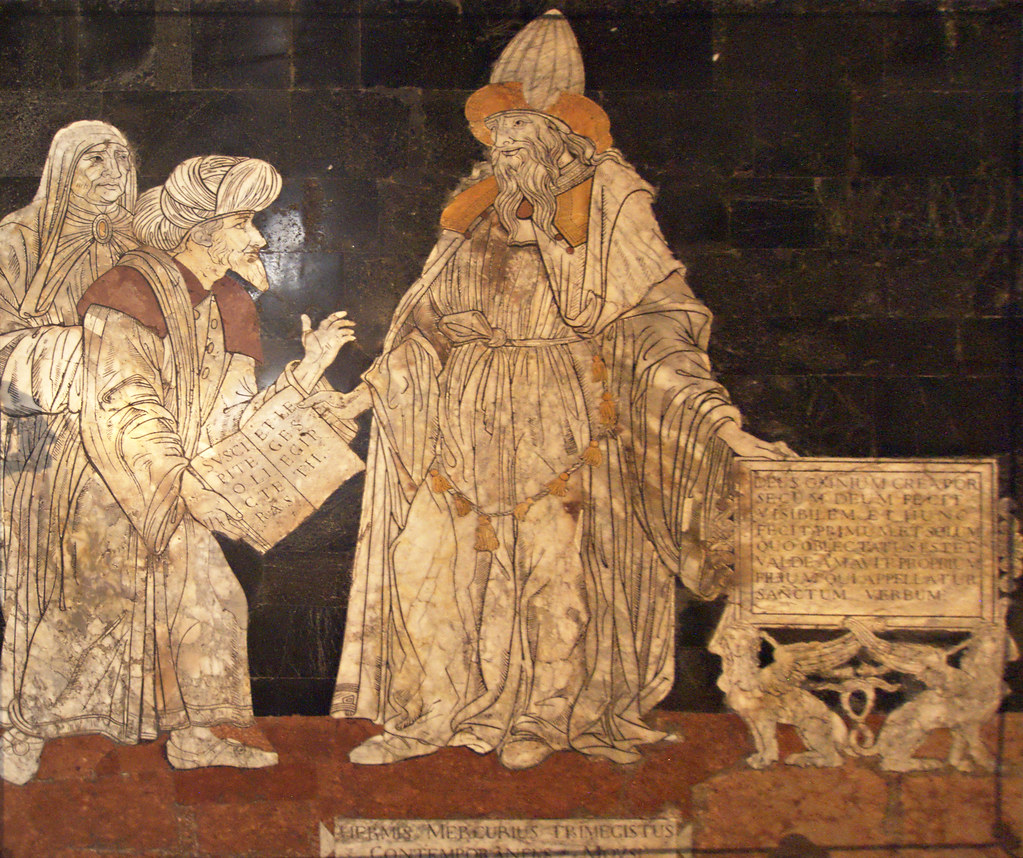
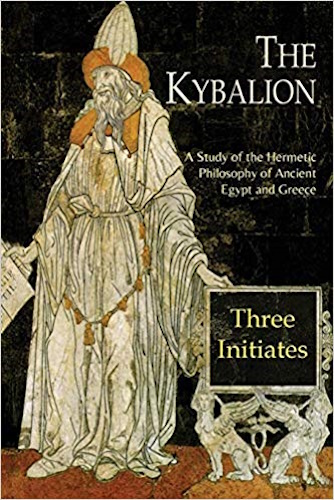

![Thrice-Greatest Hermes; Studies in Hellenistic Theosophy and Gnosis [Three Volumes in One] Thrice-Greatest Hermes; Studies in Hellenistic Theosophy and Gnosis [Three Volumes in One]](http://realityroars.com/images/affiliate-creative/thrice-greatest-hermes--studies-in-hellenistic-theosophy-and-gnosis.jpg)

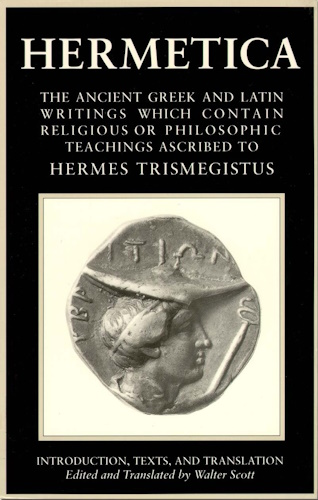



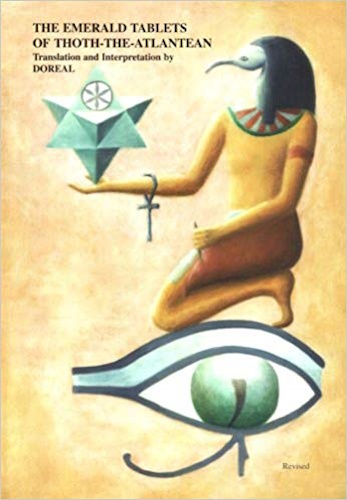

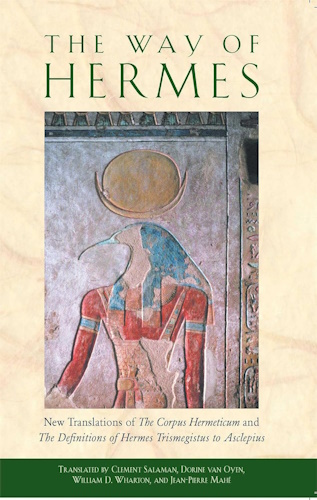

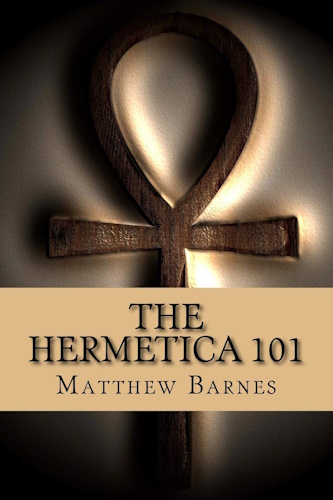

![]()
![]()
VI. In God Alone Is Good And Elsewhere Nowhere
<This sermon on the nature of the Good, like To Asclepius (CH II), relies heavily on the technical language of classical Greek philosophy - a point which some of Mead's translations tend to obscure. "The Good," in Greek thought, is also the self-caused and self-sufficient, and thus has little in common with later conceptions of "goodness," just as the Latin word virtus and the modern Christian concept of "virtue" are very nearly opposites despite their etymological connection. The word "passion" here also needs to be understood in its older sense, as the opposite of "action" (cf. "active" and "passive").
<The negative attitude toward humanity and the cosmos which appears in this text contrasts sharply with the more positive assessment found, for example, in the Poemandres (CH I) or in the Asclepius - a reminder that these documents are relics of a diverse and not necessarily consistent school of thought. - JMG>
1. Good, O Asclepius, is in none else save in God alone; nay, rather, Good is God Himself eternally.
If it be so, [Good] must be essence, from every kind of motion and becoming free (though naught is free from It), possessed of stable energy around Itself, never too little, nor too much, an ever-full supply. [Though] one, yet [is It] source of all; for what supplieth all is Good. When I, moreover, say [supplieth] altogether [all], it is for ever Good. But this belongs to no one else save God alone.
For He stands not in need of any thing, so that desiring it He should be bad; nor can a single thing of things that are be lost to him, on losing which He should be pained; for pain is part of bad.
Nor is there aught superior to Him, that He should be subdued by it; nor any peer to Him to do Him wrong, or [so that] He should fall in love on its account; nor aught that gives no ear to Him, whereat He should grow angry; nor wiser aught, for Him to envy.
2. Now as all these are non-existent in His being, what is there left but Good alone?
For just as naught of bad is to be found in such transcendent Being, so too in no one of the rest will Good be found.
For in them are all of the other things <i.e., those things which are not Good> - both in the little and the great, both in each severally and in this living one that's greater than them all and the mightiest [of them] <i.e., the cosmos>.
For things subject to birth abound in passions, birth in itself being passible. But where there's passion, nowhere is there Good; and where is Good, nowhere a single passion. For where is day, nowhere is night; and where is night, day is nowhere.
Wherefore in genesis the Good can never be, but only be in the ingenerate.
But seeing that the sharing in all things hath been bestowed on matter, so doth it share in Good.
In this way is the Cosmos Good; that, in so far as it doth make all things, as far as making goes it's Good, but in all other things it is not Good. For it's both passible and subject unto motion, and maker of things passible.
3. Whereas in man by greater or less of bad is good determined. For what is not too bad down here, is good, and good down here is the least part of bad.
It cannot, therefore, be that good down here should be quite clean of bad, for down here good is fouled with bad; and being fouled, it stays no longer good, and staying not it changes into bad.
In God alone, is, therefore, Good, or rather Good is God Himself.
So then, Asclepius, the name alone of Good is found in men, the thing itself nowhere [in them], for this can never be.
For no material body doth contain It - a thing bound on all sides by bad, by labors, pains, desires and passions, by error and by foolish thoughts.
And greatest ill of all, Asclepius, is that each of these things that have been said above, is thought down here to be the greatest good.
And what is still an even greater ill, is belly-lust, the error that doth lead the band of all the other ills - the thing that makes us turn down here from Good.
4. And I, for my part, give thanks to God, that He hath cast it in my mind about the Gnosis of the Good, that it can never be It should be in the world. For that the world is "fullness" of the bad, but God of Good, and Good of God.
The excellencies of the Beautiful are round the very essence [of the Good]; nay, they do seem too pure, too unalloyed; perchance 'tis they that are themselves Its essences.
For one may dare to say, Asclepius - if essence, sooth, He have - God's essence is the Beautiful; the Beautiful is further also Good.
There is no Good that can be got from objects in the world. For all the things that fall beneath the eye are image-things and pictures as it were; while those that do not meet [the eye are the realities], especially the [essence] of the Beautiful and Good.
Just as the eye cannot see God, so can it not behold the Beautiful and Good. For that they are integral parts of God, wedded to Him alone, inseparate familiars, most beloved, with whom God is Himself in love, or they with God.
5. If thou canst God conceive, thou shalt conceive the Beautiful and Good, transcending Light, made lighter than the Light by God. That Beauty is beyond compare, inimitate that Good, e'en as God is Himself.
As, then, thou dost conceive of God, conceive the Beautiful and Good. For they cannot be joined with aught of other things that live, since they can never be divorced from God.
Seek'st thou for God, thou seekest for the Beautiful. One is the Path that leadeth unto It - Devotion joined with Gnosis.
6. And thus it is that they who do not know and do not tread Devotion's Path, do dare to call man beautiful and good, though he have ne'er e'en in his visions seen a whit that's Good, but is enveloped with every kind of bad, and thinks the bad is good, and thus doth make unceasing use of it, and even feareth that it should be ta'en from him, so straining every nerve not only to preserve but even to increase it.
Such are the things that men call good and beautiful, Asclepius - things which we cannot flee or hate; for hardest thing of all is that we've need of them and cannot live without them.


![Thrice-Greatest Hermes; Studies in Hellenistic Theosophy and Gnosis [Three Volumes in One] Thrice-Greatest Hermes; Studies in Hellenistic Theosophy and Gnosis [Three Volumes in One]](http://realityroars.com/images/affiliate-creative/thrice-greatest-hermes--studies-in-hellenistic-theosophy-and-gnosis.jpg)











-
Urantia Book, 44:0.11 - The Celestial Artisans
Never in your long ascendancy will you lose the power to recognize your associates of former existences. Always, as you ascend inward in the scale of life, will you retain the ability to recognize and fraternize with the fellow beings of your previous and lower levels of experience. Each new translation or resurrection will add one more group of spirit beings to your vision range without in the least depriving you of the ability to recognize your friends and fellows of former estates.
-
Princess Bride 1987 Wallace Shawn (Vizzini) and Mandy Patinkin (Inigo Montoya)
Vizzini: HE DIDN'T FALL? INCONCEIVABLE.
Inigo Montoya: You keep using that word. I do not think it means what you think it means. -
Urantia Book, 117:4.14 - The Finite God
And here is mystery: The more closely man approaches God through love, the greater the reality -- actuality -- of that man. The more man withdraws from God, the more nearly he approaches nonreality -- cessation of existence. When man consecrates his will to the doing of the Father's will, when man gives God all that he has, then does God make that man more than he is.
-
Urantia Book, 167:7.4 - The Talk About Angels
"And do you not remember that I said to you once before that, if you had your spiritual eyes anointed, you would then see the heavens opened and behold the angels of God ascending and descending? It is by the ministry of the angels that one world may be kept in touch with other worlds, for have I not repeatedly told you that I have other sheep not of this fold?"
-
Urantia Book, Foreword - 0:12.12 - The Trinities
But we know that there dwells within the human mind a fragment of God, and that there sojourns with the human soul the Spirit of Truth; and we further know that these spirit forces conspire to enable material man to grasp the reality of spiritual values and to comprehend the philosophy of universe meanings. But even more certainly we know that these spirits of the Divine Presence are able to assist man in the spiritual appropriation of all truth contributory to the enhancement of the ever-progressing reality of personal religious experience—God-consciousness.
-
Urantia Book, 1:4.3 - The Mystery Of God
When you are through down here, when your course has been run in temporary form on earth, when your trial trip in the flesh is finished, when the dust that composes the mortal tabernacle "returns to the earth whence it came"; then, it is revealed, the indwelling "Spirit shall return to God who gave it." There sojourns within each moral being of this planet a fragment of God, a part and parcel of divinity. It is not yet yours by right of possession, but it is designedly intended to be one with you if you survive the mortal existence.
-
Urantia Book, 1:4.1 - The Mystery Of God
And the greatest of all the unfathomable mysteries of God is the phenomenon of the divine indwelling of mortal minds. The manner in which the Universal Father sojourns with the creatures of time is the most profound of all universe mysteries; the divine presence in the mind of man is the mystery of mysteries.
-
Urantia Book, 1:4.6 - The Mystery Of God
To every spirit being and to every mortal creature in every sphere and on every world of the universe of universes, the Universal Father reveals all of his gracious and divine self that can be discerned or comprehended by such spirit beings and by such mortal creatures. God is no respecter of persons, either spiritual or material. The divine presence which any child of the universe enjoys at any given moment is limited only by the capacity of such a creature to receive and to discern the spirit actualities of the supermaterial world.
-
Urantia Book, 11:0.1 - The Eternal Isle Of Paradise
Paradise is the eternal center of the universe of universes and the abiding place of the Universal Father, the Eternal Son, the Infinite Spirit, and their divine co-ordinates and associates. This central Isle is the most gigantic organized body of cosmic reality in all the master universe. Paradise is a material sphere as well as a spiritual abode. All of the intelligent creation of the Universal Father is domiciled on material abodes; hence must the absolute controlling center also be material, literal. And again it should be reiterated that spirit things and spiritual beings are real.
-
Urantia Book, 50:6.4 - Planetary Culture
Culture presupposes quality of mind; culture cannot be enhanced unless mind is elevated. Superior intellect will seek a noble culture and find some way to attain such a goal. Inferior minds will spurn the highest culture even when presented to them ready-made.
-
Urantia Book, 54:1.6 - True And False Liberty
True liberty is the associate of genuine self-respect; false liberty is the consort of self-admiration. True liberty is the fruit of self-control; false liberty, the assumption of self-assertion. Self-control leads to altruistic service; self-admiration tends towards the exploitation of others for the selfish aggrandizement of such a mistaken individual as is willing to sacrifice righteous attainment for the sake of possessing unjust power over his fellow beings.
-
Urantia Book, 54:1.9 - True And False Liberty
How dare the self-willed creature encroach upon the rights of his fellows in the name of personal liberty when the Supreme Rulers of the universe stand back in merciful respect for these prerogatives of will and potentials of personality! No being, in the exercise of his supposed personal liberty, has a right to deprive any other being of those privileges of existence conferred by the Creators and duly respected by all their loyal associates, subordinates, and subjects.
-
Urantia Book, 54:1.8 - True And False Liberty
There is no error greater than that species of self-deception which leads intelligent beings to crave the exercise of power over other beings for the purpose of depriving these persons of their natural liberties. The golden rule of human fairness cries out against all such fraud, unfairness, selfishness, and unrighteousness.

